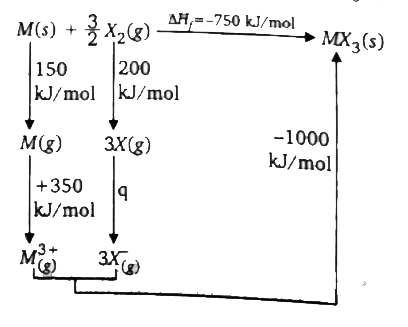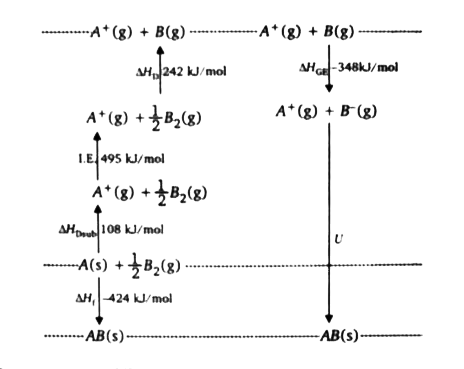Complete Solutions to SUBJECTIVE PROBLEMS of chapter PERIODIC PROPERTIES of Class 12 book with complete answers and questions
| Class 12 | CHEMISTRY |
| Chapter | PERIODIC PROPERTIES |
| VK JAISWAL | SUBJECTIVE PROBLEMS |
| Number Of Questions | 22 |
| Academic Year | 2023-24 |
The number of electrons for `Zn^(2+)` cation that have the value of azimuthal quantum number `=0` is:
View SolutionCalculate the electronegativity of silicon atom using Allred-rochow's method. If covalent radius of silicon is 1.0 A. (rounded in nearest integer value).
View SolutionIf heat of solution for AB(s) is `-0.95xx10^(x)` kcal/mol and lattice energy for `AB(s)` is 700 kcal/mol and hydration energy for `A^(+)(g)` is -1000 kcal/mol and `B^(-)(g)` is -650 kcal/mol then calculate value of x.
View SolutionConsider the following Borh-Habber's cycle for formation of `MX_(3)(s)`.

Then calculate value `(q_(1))/(50)`, here `q_(1)` is electron affinity of X(g) in kJ/mol.
View SolutionCalculate value of -U/100, for AB(s), from following data of Born-Haber's cycle. [where U is lattice energy in kJ/mol]

View SolutionConsider the following orders:
(i) `HF gt HCl gt HBr gt HI`: Lewis basic character.
(ii) `CH_(4) lt C Cl_(4) lt CF_(4)`: Electornegativityy of central 'C'-atom.
(iii) `Mg^(2+) lt K^(+) lt S^(2-) lt Se^(2-)`: ionic radius
then calculate vlaue of `|x-y|^(2)`, where x and y are correct and incorrect order respectively.
View SolutionFind out total number of representative elements in the given element:
Cd, Nb, Ta, Te, Ra, Mo, Po, Pd, Tc
View SolutionAn element 'X' has its electronic configuration of 'K' shell is `(n-5)s^(2)` and it has total number of electrons in its outermost, penultimate and antipenultimate shell are 2,8 and 25 respectively then find out total number of unpaired electrons in element 'X' in their ground state.
View Solutionif value of spin quantum number`(s)=-1//2,0,+1//2` then calculate number of groups in the new form of periodic table if all other rules of electronic configurations are remain same.
View SolutionHow many pairs are, in which first species has lower ionisation enegy than second species:
(i) N and O
(ii) Br and K
(iii) Be and B
(iv) I and `I^(-)`
(V) Li and `Li^(+)`
(vi) and O and S
(vii) Ba and Sr.
View SolutionTotal number of element(s) which have only single oxidation state (other than zero) in their corresponding stable compounds: Cs, Ba, F, Zn,Be,Al, Sr,Ga, Pb.
View SolutionThe number of electrons for `Zn^(2+)` cation that have the value of azimuthal quantum number `=0` is:
View SolutionCalculate the electronegativity of silicon atom using Allred-rochow's method. If covalent radius of silicon is 1.0 A. (rounded in nearest integer value).
View SolutionIf heat of solution for AB(s) is `-0.95xx10^(x)` kcal/mol and lattice energy for `AB(s)` is 700 kcal/mol and hydration energy for `A^(+)(g)` is -1000 kcal/mol and `B^(-)(g)` is -650 kcal/mol then calculate value of x.
View SolutionConsider the following Borh-Habber's cycle for formation of `MX_(3)(s)`.

Then calculate value `(q_(1))/(50)`, here `q_(1)` is electron affinity of X(g) in kJ/mol.
View SolutionCalculate value of -U/100, for AB(s), from following data of Born-Haber's cycle. [where U is lattice energy in kJ/mol]

View SolutionConsider the following orders:
(i) `HF gt HCl gt HBr gt HI`: Lewis basic character.
(ii) `CH_(4) lt C Cl_(4) lt CF_(4)`: Electornegativityy of central 'C'-atom.
(iii) `Mg^(2+) lt K^(+) lt S^(2-) lt Se^(2-)`: ionic radius
then calculate vlaue of `|x-y|^(2)`, where x and y are correct and incorrect order respectively.
View SolutionFind out total number of representative elements in the given element:
Cd, Nb, Ta, Te, Ra, Mo, Po, Pd, Tc
View SolutionAn element 'X' has its electronic configuration of 'K' shell is `(n-5)s^(2)` and it has total number of electrons in its outermost, penultimate and antipenultimate shell are 2,8 and 25 respectively then find out total number of unpaired electrons in element 'X' in their ground state.
View Solutionif value of spin quantum number`(s)=-1//2,0,+1//2` then calculate number of groups in the new form of periodic table if all other rules of electronic configurations are remain same.
View SolutionHow many pairs are, in which first species has lower ionisation enegy than second species:
(i) N and O
(ii) Br and K
(iii) Be and B
(iv) I and `I^(-)`
(V) Li and `Li^(+)`
(vi) and O and S
(vii) Ba and Sr.
View SolutionTotal number of element(s) which have only single oxidation state (other than zero) in their corresponding stable compounds: Cs, Ba, F, Zn,Be,Al, Sr,Ga, Pb.
View Solution
SUBJECTIVE PROBLEMS questions and complete solutions for chapter PERIODIC PROPERTIES of VK JAISWAL CHEMISTRY (HINGLISH) of Class 12